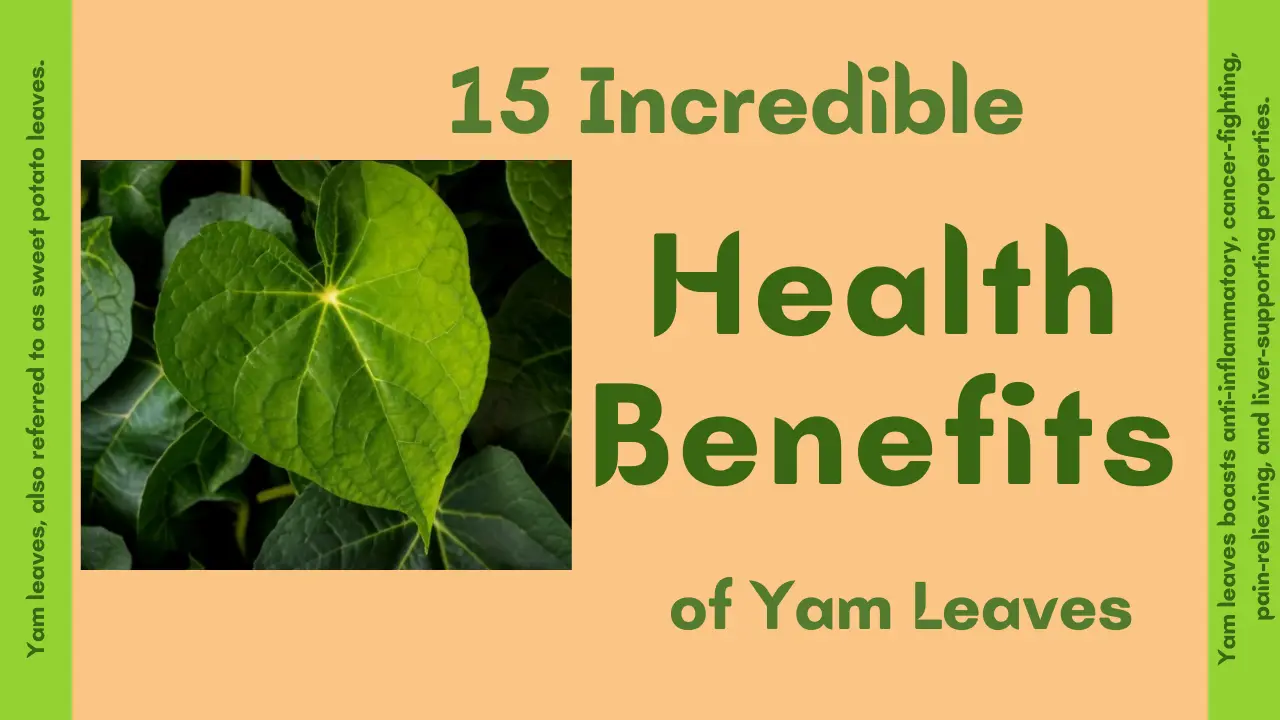Introduction
Yam leaves, also referred to as sweet potato leaves, are the fresh, edible leaves arising from the vegetative vines and shoots of yam tubers. Classified as botanical species Ipomoea batatas, the fast-growing tropical vines produce large, starchy tubers underground and vibrant green leaves above ground. Yam leaves offer an entirely edible, nutritious component of the root plant.
While the starchy yam tubers are more widely consumed, the leafy greens have been used traditionally for their medicinal, health-promoting properties in certain African, Asian, and South American cultures for generations. Yam leaves have only begun gaining more recognition for their highly nutritious profile in recent decades.
This article will cover the excellent nutritional value of yam leaves, explain the 15 health benefits of yam leaves, and provide recipes for enjoying their versatile flavours.
Not to be confused with other edible leafy greens called yam greens, these specifically come from the root tuber Ipomoea batatas plant. Wild yam leaves have separate health effects.
So, let’s move on and explore the incredible health benefits of yam leaves and their recipes.
Do read the People Also Ask (FAQs) about this topic.
Key Takeaways
- Yam leaves offer an abundant source of protective nutrients including vitamins, minerals, fibre and antioxidants like beta-carotene. This includes 25-30% RDI for vitamins A, C, and B6.
- Current research links yam leaves to 15 evidence-based health benefits backed by emerging science on their biological activities and traditional medicinal uses.
- Anti-inflammatory, cancer-combating, pain-relieving, liver-supporting properties are among the wellness perks attributed to compounds found in yam leaves.
- Additional studied effects show they can aid digestion, respiration, immunity, cognition, skin health, hormones, weight loss, and heart health. REGULATE BLOOD SUGAR
- With versatility as an ingredient, yam leaves can be incorporated into many foods and recipes like soups, stir-fries, salads, drinks and more as a spinach substitute. REVISE TO REFLECT ALL 15 BENEFITS
- Incorporating more yam leaves provides easy, low-risk access to their wealth of disease-fighting antioxidants and nourishing plant nutrients that support whole-body health. REGULATE BLOOD SUGAR
15 Health Benefits of Yam Leaves
With their highly nutritious profiles, unsurprisingly yam leaves have been associated with a variety of health and medicinal effects. Current research analyzing their biological activities suggests yam leaves may provide benefits like:
- Reduce Inflammation
- Support Heart Health
- Control Blood Sugar Levels
- Aid Digestion & Gut Health
- Boost Liver Function
- Support Kidney Health
- Increase Circulation & Wound Healing
- Reduce Pain & Cramps
- Combat Asthma & Respiratory Issues
- Support Skin Health
- Prevent Cancer Cell Growth
- Enhance Cognitive Function
- Boost Immunity
- Lose Weight
- Balance Hormones
1. Reduce Inflammation – Chronic inflammation drives most diseases, including cancer, diabetes and autoimmune conditions. Yam leaves are packed with antioxidant and anti-inflammatory compounds that combat inflammation. Their antioxidant value measured by ORAC score is very high at 1,780 μmol TE per 100 grams.
2. Support Heart Health – From antioxidants that protect artery walls from free radical damage to B-vitamins that convert food into cellular energy, compounds in yam leaves help regulate heart rhythm and blood flow. Small studies find yam leaf extract lowers blood pressure and cholesterol.
3. Control Blood Sugar Levels – In animal studies, administering yam leaf extract significantly reduced fasting blood glucose levels by up to 30% compared to controls. Researchers believe antioxidant and enzyme-inhibiting effects are responsible for regulating healthy blood sugar.
4. Aid Digestion & Gut Health – Fiber and antibacterial ingredients in yam leaves make them prebiotic and probiotic. This optimizes digestion, reduces gut inflammation, enhances nutrient absorption, and maintains favourable gut flora linked to immunity.
5. Boost Liver Function – Early research indicates oral supplementation with dried yam leaf extract exerted protective, beneficial effects on liver function in rats. Antioxidant activity prevents free radical damage responsible for liver disease progression.
6. Support Kidney Health – Yam leaves contain potassium that regulates fluid balance and stimulates urine flow to flush toxins from the kidneys. Diuretic, antispasmodic, and pain-relieving properties also prevent kidney stones and relieve UTI pain.
7. Increase Circulation & Wound Healing – Essential building blocks for tissue growth and repair found abundantly in yam leaves help speed up cellular regeneration and boost circulation. This aids in recovery from wounds, sprains or post-surgery.
8. Reduce Pain & Cramps – Soothing, antispasmodic compounds in yam leaves have been used traditionally for centuries to relieve menstrual cramps and muscle pains. Modern research backs up efficacy for reducing contractions.
9. Combat Asthma & Respiratory Issues – Studies demonstrate yam leaf extracts relax bronchial smooth muscle and open airways which may relieve asthma attacks, wheezing, chronic cough and seasonal allergies.
10. Support Skin Health – Collagen-producing vitamins C and E along with tissue-healing allantoin in yam leaves help repair skin cells damaged from sun exposure, burns or infections for vibrant, youthful skin tone and texture.
11. Prevent Cancer Cell Growth – Test tube research detects potent anti-cancer abilities from yam leaf extract and specific isolated chemical constituents. This includes initiating cancer cell death and disrupting malignant replication pathways for a disease-fighting effect.
12. Enhance Cognitive Function – Antioxidant compounds in yam leaves that protect brain tissue from oxidative damage may prevent dementia progression and age-related cognitive decline. More studies are underway for a definitive correlation.
13. Boost Immunity – Containing almost every single immune-strengthening vitamin, mineral and antioxidant needed for white blood cell production, yam leaves build resilient immunity against bacterial and viral pathogens.
14. Lose Weight – The fibre filling up your stomach signals satiety while stimulant compounds increase fat metabolism for weight loss. Yam leaves specifically target visceral belly fat while helping build calorie-burning muscle.
15. Balance Hormones – For women struggling with infertility, menstrual or menopause problems, yam leaves contain steroidal saponins that mimic estrogen and progesterone for gentle, plant-based hormonal support.
Keep in mind research is still emerging regarding the health benefits of yam leaves, particularly in human clinical trials. However, the foundational cellular pathways and traditional medicinal use provide a promising starting point.
Incorporating yam leaves into your diet or using extracts offers very little risk compared to consuming purified isolated compounds. Now let’s explore simple ways of enjoying their dynamic flavor!
Nutritional Value of Yam Leaves
Two cups of raw yam leaves (68 grams) contain:
- 44 calories
- 7 grams carbohydrates
- 4 grams protein
- 3 grams fiber
This portion also provides around 25-30% of the RDI for vitamin A, vitamin C, vitamin B6 and antioxidants like beta carotene.
Additional vitamins, minerals and beneficial plant compounds found in yam leaves include:
- Vitamin E
- Vitamin K
- Riboflavin
- Thiamin
- Niacin
- Calcium
- Magnesium
- Manganese
- Potassium
- Iron
Along with antioxidants, yam leaves contain the plant nutrients allantoin, chlorogenic acids, saponins and phytosterols. This combination of vitamins, minerals and diverse plant compounds contributes to the emerging research on yam leaves’ health benefits.
Tasty Yam Leaf Recipe Ideas
Raw or cooked, yam leaves have a tender texture and sweet, somewhat herbal taste. Their flexibility allows yam leaves to be prepared in every cuisine from stir fries to teas. You can substitute them into any dish in place of spinach, kale or other greens. Get creative with these recipes:
Yam Leaf Salad
Blanch fresh yam leaves then toss with tomatoes, onion, cucumber, feta and balsamic dressing for a nutrient-packed salad.
Yam Leaf Smoothie
Boost Add a handful of young leaves into your morning fruit smoothie for an extra dose of vitamins and minerals.
Yam Leaf Tea
Steep dried leaves extract potent plant compounds beneficial for digestion, immunity and hormone balance. Sweeten with honey.
Yam Leaf Soup
Saute onions and garlic then add broth, chopped yam leaves and potatoes for a comforting vitamin-rich soup perfect when sick.
Yam Leaf Pesto
Puree vitamin-packed yam leaves with olive oil, parsley, lemon, and pine nuts then toss with cooked pasta or rice for a delicious pesto.
Yam Leaf Stir
Fry Quickly fry chopped yam leaves in sesame oil with ginger, veggies and protein of choice then serve over rice noodles.
The options are endless for using more vitamin-rich yam leaves as either a vegetable side dish or boosting ingredient in main courses, snacks and desserts. Substitute them for any recipe using spinach for extra nutrition.
Explore Incorporating More Yam Leaves
Packed with protective plant nutrients and promising disease-fighting abilities according to emerging research, vibrant green yam leaves deserve a regular spot on your plate. Sauteeing, blanching or blending fresh young leaves optimizes nutrient absorption while unlocking their dynamic herbal, earthy flavour.
Incorporating yam leaves more often provides easy access to their anti-inflammatory vitamins, minerals and antioxidants beneficial for whole-body wellness. Allow their versatility to enhance your favourite entrees, drinks, snacks and desserts.
With minimal risk and maximum nutritional potential, what’s not to love about adding more yam leaves to your fork?
Conclusion
Packed with protective vitamins, minerals and other beneficial plant compounds, vibrant green yam leaves deserve more nutritional recognition for their versatility and health-promoting abilities. Emerging research shows they deliver science-backed benefits spanning improved immunity, cognition, respiration, skin health, weight regulation, and protection against inflammation, cancer, diabetes, pain, kidney issues, and heart disease.
As studies continue investigating their biological impacts, the foundational cellular pathways affected and traditional medicinal use provide reason to believe yam leaves can enhance whole-body wellness. Incorporating more of their dynamic, nutrient-rich flavour into soups, teas, stir-fries, smoothies and other everyday recipes allows you to reap the anti-inflammatory advantages linked to fighting disease and optimizing health.
People Also Ask (FAQs)
Q) Yam leaf benefits for weight loss
A) Yam leaves provide fibre for satiety, stimulant compounds to increase metabolism and target visceral belly fat while helping build calorie-burning muscle. This combination of effects supports healthy, sustainable weight management.
Q) Yam leaf benefits for skin
A) The collagen-producing vitamins C and E along with tissue-healing allantoin in yam leaves help repair skin cells damaged from sun exposure, burns or infections for vibrant, youthful skin tone and texture.
Q) Yam leaf benefits for men
A) Antioxidants protect sperm and testosterone from free radical damage. Enzyme-inhibiting compounds also regulate hormones implicated in low T and regulate metabolism to reduce belly fat storage for better physique goals.
Q) How to cook yam leaves:
A) Yam leaves can be cooked by blanching, boiling, steaming, pan frying, or sauteeing for just 2-5 minutes until slightly wilted. Avoid overcooking the tender greens. They pair well with olive oil, garlic, onions, broth, rice, root vegetables, meat and seafood.
Q) Benefits of yam leaves tea
A) Yam leaf tea provides hydration along with anti-inflammatory, hormone-regulating, digestive-soothing and immunity-boosting compounds extracted from the leaves through hot water steeping.
Q) Yam leaf plant
A) The yam leaf plant refers to the above-ground leafy vegetation that grows from the underground yam tuber bulb plant classified as Dioscorea alata in the family Dioscoreaceae.
Q) Health benefits of water yam leaves
A) Water yam leaves offer similar benefits as other yam leaves but may exert additional antimicrobial, antifungal and wound healing properties according to some studies. More research is needed.
Q) Yam leaves in Hindi
A) In Hindi, yam leaves are referred to as “जिमीकंद के पत्ते (jimikand ke patte)”.
Q) Benefits of three-leaf yam
A) Research into Dioscorea dumetorum specifically is limited but this wild tropical vine variety likely shares similar nutrients and antioxidants linked to the health benefits of other yam leaves.
Q) Medical benefits of yams
A) Medical research shows compounds in yams may help regulate blood sugar, protect heart health, reduce inflammation, ease menopause symptoms, boost immunity, aid digestion, enhance brain function, and provide antioxidants against diseases like cancer.
Q) Benefits of sweet potato leaves
A) Sweet potato leaves offer antimicrobial, antihypertensive, antidiabetic, anti-inflammatory, and antioxidant benefits according to preliminary cell studies. Further research is warranted to confirm the effects.
Q) Is three-leaf yam good for diabetics
A) Some research suggests compounds in certain yam species can reduce blood sugar levels and protect insulin-producing cells. However, human trials are still needed, especially on the three-leaf variety, to confirm anti-diabetic effects and safety for diabetics.












